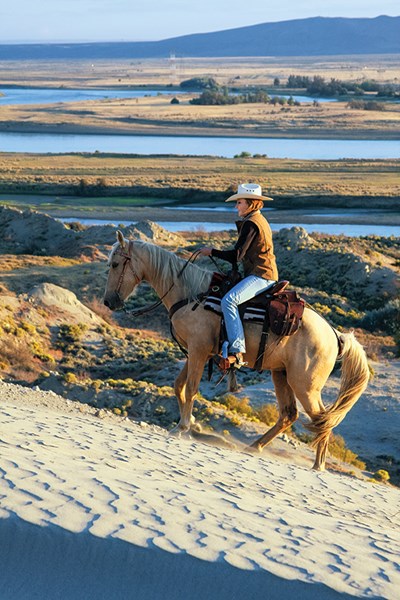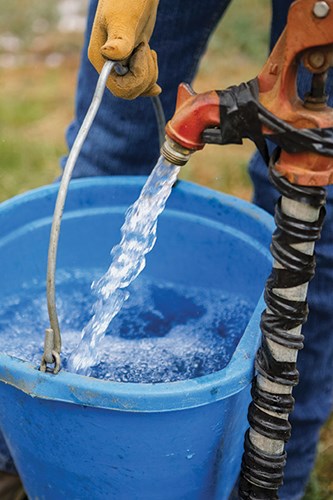Does your trail horse need electrolytes? Unless you’re seriously competing in endurance riding, most horses do fine on good-quality feed, forage (pasture and/or hay), a salt block, and occasional supplementation, as needed. It’s the “as needed” part that can be the puzzle.

Administering electrolytes is a matter of balance. First, ask your veterinarian. Your horse is an individual, not an industry norm. Not all horses need electrolytes before a trail ride.
Most experts don’t recommend daily electrolyte supplements, although a horse who doesn’t like licking salt in summer may benefit.
On the other hand, while horses mostly eliminate excess electrolytes in a matter of hours through urination, giving one great mega-dose when your horse is already stressed can actually cause dehydration by drawing fluid to the intestinal tract from the rest of his body.
How Electrolytes Work
Electrolytes are body salts that break down into positive or negative ions when they dissolve. Those ions let cells “fire up” to do their job. Different salts are necessary for different cells, but they all work together in a precise balance that controls nearly every function of the body — especially nerves and muscles. They also help signal to a horse that he’s thirsty.
Electrolytes are primarily lost through sweat when horses overheat, overwork, or overstress. Sweat is actually a form of natural air conditioning that lowers body temperature by evaporating on the skin. Blood transfers heat from the body core up closer;to the skin, which is then cooled by that evaporating sweat.
In a frustrating cycle, the hotter your horse gets, the more blood is needed to lower his body temperature. But some of the liquid needed for that cooling sweat is pulled from the blood. This lowers blood volume. So, as the demand for blood volume increases, the amount of fluid available for that blood decreases, as more and more water is sweated away.
High humidity can produce buckets of visible sweat, but dry heat can be just as dangerous, because evaporation may occur so rapidly that you might not realize how much moisture your horse is actually losing.
Astoundingly, a horse that’s working hard in hot weather or is highly stressed can lose more than three gallons of water in an hour.

That sort of loss maintained over many hours without electrolyte support and a great deal of water produces dehydration and electrolyte imbalance.
Depending on how severe this gets, the result can be extreme fatigue, muscle cramps, colic, heart problems, interference with communications between brain, nerves, and muscles, and eventual collapse.
The all-too-true, “You can lead a horse to water, but you can’t make him drink” makes things worse. Exercise can suppress your horse’s desire to drink, even though his body might be dehydrating.
4 Electrolyte Tips
If you do decide to give your horse electrolytes, here are a few buying and use tips.
• Read the label. The best commercial preparations contain sodium, chloride, potassium, calcium, phosphorus, and magnesium. Some add other trace minerals and nutritional supplements. Others add sugar, flavors, and various “fillers,” which add to cost but might make the supplement more palatable your horse. However, too much sugar (anything that ends in “ose”) actually interferes with electrolyte assimilation. Do not give electrolytes containing bicarbonate as a supplement for stress and exercise. This is formulated for horses with diarrhea.
• Time it right. If you do decide to supplement, relatively low levels of electrolytes to should be administered the night before (essentially to get your horse to tank up on water), then an hour or so before you start to trailer-load or ride. If the stress will last all day, plan on giving electrolytes every three to four hours, with more at the end and a bit more for a day or two after.

• Consider the formulation. Electrolyte powders can be added to feed and/or water. Drinking just electrolyte-laced water can actually lead to more dehydration, so always provide ample fresh water, as well. Pastes are squeezed directly onto the back of the tongue, like dewormers. For horses with nimble upper lips that can separate powders from their dinner more efficiently than a chef’s sieve, you can buy gels that will stick to grain. Both types are handy, because you can be (relatively) sure that the correct dose actually goes down your horse’s gullet.
• Make your own. You can make your own electrolytes by mixing up equal quantities of table salt and Morton’s Lite Salt. Add an ounce or two, as needed, to your horse’s grain. You can also make electrolyte-laced horse cookies that you can take with you on the trail.
Seasoned equine journalist Tracey Emslie of Fort Collins, Colorado, has been raising, training, and riding horses Western, English, sidesaddle, over fences, and in pursuit of cattle for 48 years.
Electrolyte Cookies
Feel free to experiment with your horse’s favorite taste treats. Ranges of ingredients are given. Start out with the smaller amounts, and adjust if the dough seems too gooey or too dry. It should be about the same consistency as a tube of prepared cookie dough.
Ingredients
• 2-3 cups of a combination of grain
and oats (rolled, crimped, or instant
oatmeal)
• 3 cups of bran
• ¾ to 1 cup of molasses
• ¾ cup maple or pancake syrup (skip
this if you want to limit sugars)
• 1 to 1¾ cup hot water or corn oil
(or a mixture of the two)
• 24 oz. of powdered electrolytes
• Shredded carrots, chopped dehydrated
apples, or other horse goodies
Directions
Step 1. Mix all ingredients together into
a dough. If you’ve added extra goodies,
you’ll probably have to add extra water to
get the right consistency. (Much depends
on your altitude.)
Step 2. Place spoonfuls of dough on a
cookie sheet (greased if using a conventional
sheet) or in muffin cups.
Step 3. Bake at 350 degrees for about 30
minutes, but watch closely. Depending
on your proportions, there may be a tendency
to burn. Cook until firm.
Step 4. Remove from cookie sheet.
Place on a cooling rack immediately.
Step 5. Store. Store the cookies in plastic
zip-close bags.
— Courtesy of Endurance.Net
Electrolyte Resources
The Distance Depot
Endura-Max; Lyte Now Electrolyte Paste; Perfect Balance Electrolite Paste; Perform
N Win www.thedistancedepot.com
Dyna-Mite
Dyna Spark; Izimine; NTM Salt
(888) 762-4036;
Horse Tech
Quench!
(800) 831-3309
Kauffman’s Animal Health
Hydromax, Original Line
(800) 332-5244
Kentucky Performance Products
Summer Games Electrolyte
(859) 873-2974
ShanesTack.com
Sport Likit
(866) 331-1920
Smart Pak Equine
Acculytes; Apple-A-Day; Perfect Balance
Electrolite Paste; Stress Dex
(888) 773-2716






